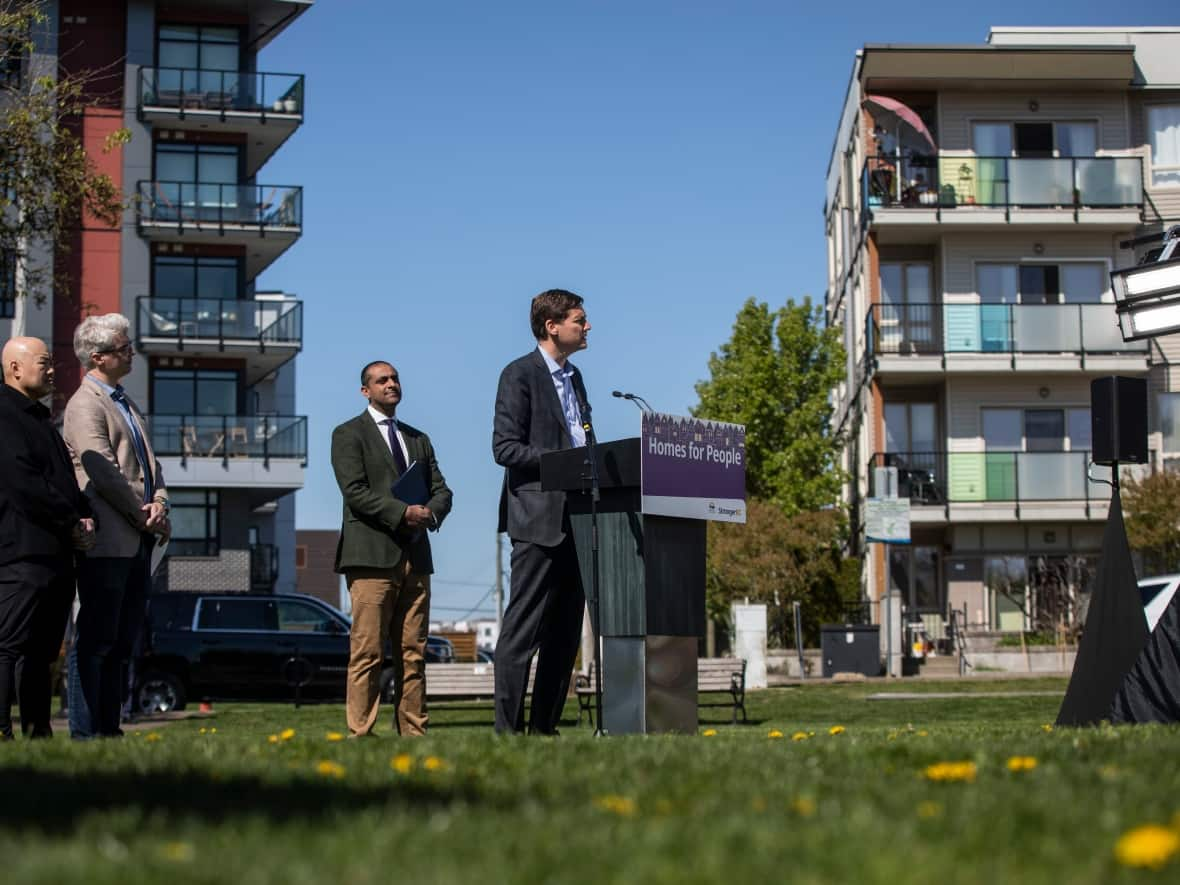19,000 homes are permanently listed as short-term rentals, B.C. government says

A provincial rule to limit short-term rentals to a homeowner's principal residence plus one secondary suite or accessory dwelling comes into force in British Columbia on May 1 in 60 communities, while 17 additional communities have chosen to opt into the rules, despite being exempt.
An update for the province's Short-Term Rental Accommodations Act was provided by Premier David Eby and B.C. Minister of Housing Ravi Kahlon at a media event on Thursday in Langley, B.C.
May 1 is the deadline for many changes telegraphed in October when the province introduced the act.
The government's hope is to limit housing from being rented through platforms like Airbnb, VRBO, Expedia and FlipKey, when they could instead be used for stable, long-term homes in cities where residents struggle to find appropriate housing.
"Balanced new rules to crack down on speculators who are effectively operating mini hotels, while also ensuring homeowners can still rent out spaces in their principal residence," said Eby on Thursday.
Eby said that the rule changes will limit short-term rental units to within the principal home of a host, but the move isn't a ban on platforms such as Airbnb if they aren't used to create de facto hotels from B.C.'s housing stock.
"If there's a major event (such as a) Taylor Swift concert, a FIFA-like event and somebody wants to rent out their primary residence and go away for the weekend to avoid the crush of the crowds, they can still do that," he said.
Eby made his comments as the province announced new figures gathered in March that showed more than 19,000 entire homes being listed as short-term rentals.
He said the changes will allow both the province and local governments to crack down on speculators.
"If you're flipping homes, if you're buying places to do short-term rental, if you're buying a home to leave it vacant, we have consistently, publicly, repeatedly sent the message: Do not compete with families and individuals that are looking for a place to live with your investment dollars."
Since the measures were proposed, some communities have welcomed them, while others have protested that they will stifle housing meant to bolster economic drivers like tourism.
Along with the principal residence requirement, the changes set to be in place on May 1 are a requirement for business licences to be displayed on platforms and the closing of loopholes that allow short-term rental hosts to operate under pre-existing municipal rules.
Short-term rental platforms must begin sharing data with the province.
'Ask your host'
Kahlon said also starting May 1 is a process for local governments to advise hosts and platforms not complying with the rules to remove listings, or otherwise face fines as much as $10,000.
"Ask your host if they are compliant with the new rules," advised Kahlon to people renting on short-term rental platforms. "The responsibility to comply with the rules falls with the host and short-term rental platform."
He said guests would not be fined if they were staying in a non-compliant short-term rental.

Kahlon said he expected most enforcement would be done digitally, with platforms and municipalities pairing seamlessly to share data with the province. Booking.com and Expedia were already working with the province in this way, he said.
Four people have been hired to staff a provincial short-term rental compliance and enforcement unit, with potential for another 12 to be added.
"We will expand the team as required but we have found so many digital tools available for us to be able to ensure that both the cities have the accountability from the platforms and the platforms have the information that they need to be able to take action," said Kahlon.
Opting in, getting out
The province said on Thursday that 17 communities have decided to opt into the principal resident requirement of the act despite being exempt because they don't meet a population threshold.
The communities announced Thursday include the District of Kent, Tofino, Gabriola Island, Bowen Island, Osoyoos and Pemberton, in addition to several electoral areas. The new rules won't come into force for these municipalities until Nov. 1, said Kahlon.
Earlier this spring a group of nearly 300 B.C. property owners took the province and City of Victoria to court over new provincial limits on short-term rentals.
They claim the rules aren't legal and will result in significant financial losses for short-term rental owners.
"We are very confident in the legal authority of the province to regulate the housing sector in this way and we'll make the arguments that are needed in court," said Eby on Thursday when asked about the legal action.
Four communities that have met a rental vacancy rate of three per cent or more for two consecutive years have been allowed to opt out of the principal residence requirement of the act. They are West Kelowna, Fort St. John, Dawson Creek and Pouce Coupe.


